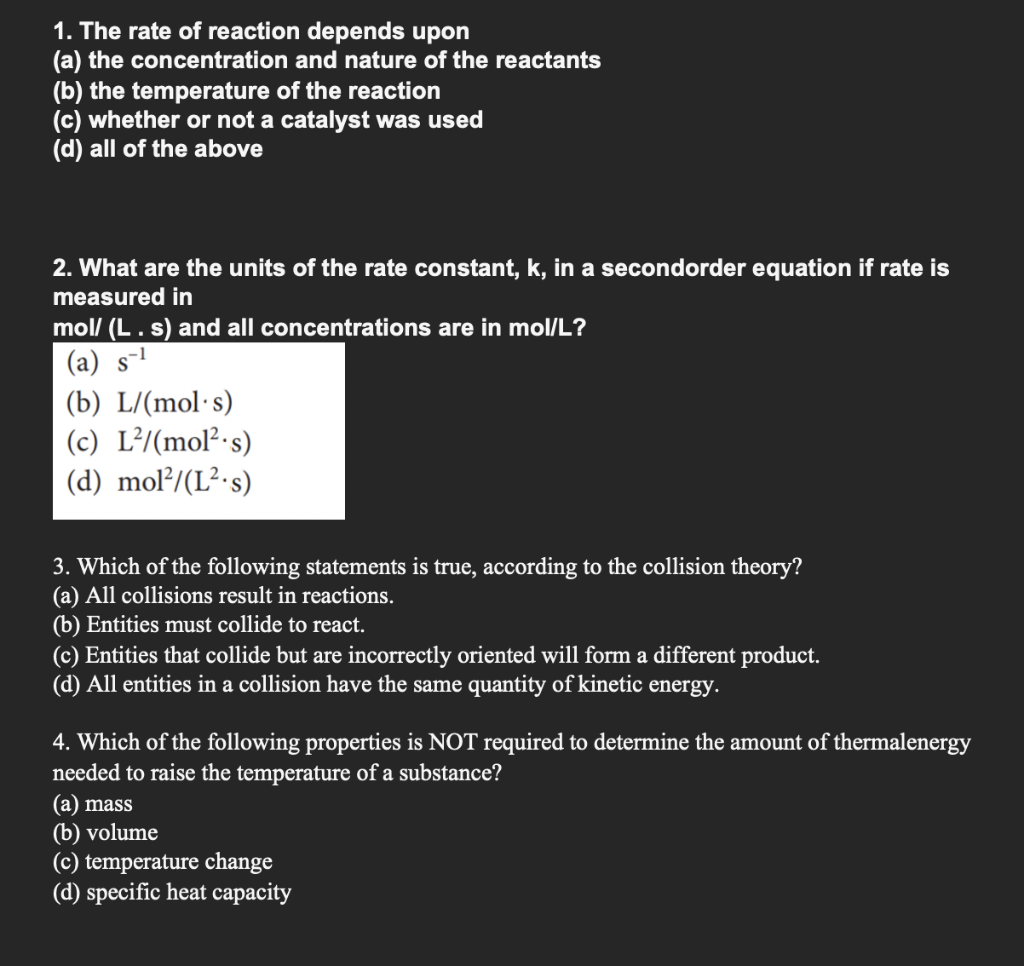1. The rate of reaction depends upon (a) the concentration and nature of the reactants (b) the temperature of the reaction (c) whether or not a catalyst was used (d) all of the above 2. What are the units of the rate constant, k, in a secondorder equation if rate is measured in mol/ (L . s) and all concentrations are in mol/L? (a) (b) L/(mol·s) (c) L²/(mol²-s) (d) mol?/(L²-s) 3. Which of the following statements is true, according to the collision theory? (a) All collisions result in reactions. (b) Entities must collide to react. (c) Entities that collide but are incorrectly oriented will form a different product. (d) All entities in a collision have the same quantity of kinetic energy. 4. Which of the following properties is NOT required to determine the amount of thermalenerg needed to raise the temperature of a substance? (a) mass (b) volume (c) temperature change (d) specific heat capacity
1. The rate of reaction depends upon (a) the concentration and nature of the reactants (b) the temperature of the reaction (c) whether or not a catalyst was used (d) all of the above 2. What are the units of the rate constant, k, in a secondorder equation if rate is measured in mol/ (L . s) and all concentrations are in mol/L? (a) (b) L/(mol·s) (c) L²/(mol²-s) (d) mol?/(L²-s) 3. Which of the following statements is true, according to the collision theory? (a) All collisions result in reactions. (b) Entities must collide to react. (c) Entities that collide but are incorrectly oriented will form a different product. (d) All entities in a collision have the same quantity of kinetic energy. 4. Which of the following properties is NOT required to determine the amount of thermalenerg needed to raise the temperature of a substance? (a) mass (b) volume (c) temperature change (d) specific heat capacity
Chemistry for Engineering Students
4th Edition
ISBN:9781337398909
Author:Lawrence S. Brown, Tom Holme
Publisher:Lawrence S. Brown, Tom Holme
Chapter11: Chemical Kinetics
Section: Chapter Questions
Problem 11.100PAE
Related questions
Question

Transcribed Image Text:1. The rate of reaction depends upon
(a) the concentration and nature of the reactants
(b) the temperature of the reaction
(c) whether or not a catalyst was used
(d) all of the above
2. What are the units of the rate constant, k, in a secondorder equation if rate is
measured in
mol/ (L. s) and all concentrations are in mol/L?
(a)
(b) L/(mol's)
(c) L²/(mol² s)
(d) mol²/(L².s)
3. Which of the following statements is true, according to the collision theory?
(a) All collisions result in reactions.
(b) Entities must collide to react.
(c) Entities that collide but are incorrectly oriented will form a different product.
(d) All entities in a collision have the same quantity of kinetic energy.
4. Which of the following properties is NOT required to determine the amount of thermalenergy
needed to raise the temperature of a substance?
(a) mass
(b) volume
(c) temperature change
(d) specific heat capacity
Expert Solution
This question has been solved!
Explore an expertly crafted, step-by-step solution for a thorough understanding of key concepts.
Step by step
Solved in 2 steps with 1 images

Knowledge Booster
Learn more about
Need a deep-dive on the concept behind this application? Look no further. Learn more about this topic, chemistry and related others by exploring similar questions and additional content below.Recommended textbooks for you

Chemistry for Engineering Students
Chemistry
ISBN:
9781337398909
Author:
Lawrence S. Brown, Tom Holme
Publisher:
Cengage Learning

Chemistry: Principles and Reactions
Chemistry
ISBN:
9781305079373
Author:
William L. Masterton, Cecile N. Hurley
Publisher:
Cengage Learning

Chemistry by OpenStax (2015-05-04)
Chemistry
ISBN:
9781938168390
Author:
Klaus Theopold, Richard H Langley, Paul Flowers, William R. Robinson, Mark Blaser
Publisher:
OpenStax

Chemistry for Engineering Students
Chemistry
ISBN:
9781337398909
Author:
Lawrence S. Brown, Tom Holme
Publisher:
Cengage Learning

Chemistry: Principles and Reactions
Chemistry
ISBN:
9781305079373
Author:
William L. Masterton, Cecile N. Hurley
Publisher:
Cengage Learning

Chemistry by OpenStax (2015-05-04)
Chemistry
ISBN:
9781938168390
Author:
Klaus Theopold, Richard H Langley, Paul Flowers, William R. Robinson, Mark Blaser
Publisher:
OpenStax

Introduction to General, Organic and Biochemistry
Chemistry
ISBN:
9781285869759
Author:
Frederick A. Bettelheim, William H. Brown, Mary K. Campbell, Shawn O. Farrell, Omar Torres
Publisher:
Cengage Learning

Principles of Modern Chemistry
Chemistry
ISBN:
9781305079113
Author:
David W. Oxtoby, H. Pat Gillis, Laurie J. Butler
Publisher:
Cengage Learning

Chemistry: Principles and Practice
Chemistry
ISBN:
9780534420123
Author:
Daniel L. Reger, Scott R. Goode, David W. Ball, Edward Mercer
Publisher:
Cengage Learning